College changed my life. I studied subjects I had never heard of before, worked through challenging concepts I didn’t know I was capable of understanding, and found myself deeply in love with learning. Through my study of other people and places, I learned about myself and began to develop a worldview that would carry me into young adulthood. It is an experience I would want for anyone who feels drawn to higher education.
However, we know that many people are not as fortunate as I was to receive such a life-changing education. Luckily, that may be slowly changing for one of our country’s most vulnerable populations — prisoners.
Last week, the U.S. Department of Education >>announced a pilot program to allow prisoners to access Pell grants to pay for college tuition. This announcement coincided with President Obama’s >>visit to a federal prison and his decision to >>commute the sentences of 46 drug offenders. The President has stated that he wants to see changes in sentencing policies and a reduction in the use of solitary confinement. He also wants to fund more job-training and help ex-convicts bridge the gap from prison to civilian life. The announcement from the Department of Education regarding Pell grants could go a long way to helping the President meet some of these goals.
In 1994, legislation passed that banned prisoners from accessing government student aid. Prior to 1994, it was common practice for prisoners to use Pell grants to pay for education. Pell grants are available to low-income students, and they don’t have to be repaid. While prisoners remained a very small percentage (>>less than 1 percent) of students that accessed Pell grants, even that small number had the ability to change lives. While some prisoners are still able to pursue education through privately funded programs, the number that receive that opportunity was greatly reduced after the 1994 decision.
However, the 1965 Higher Education Act includes a clause that allows the government to make temporary changes to student aid policy at specific test sites to determine whether or not a permanent shift in policy would be beneficial. This clause allows the Department of Education to establish this new pilot program for prisoners.
In a country that is torn apart by vicious prison-sentencing and discriminatory policing, it is vital that large-scale criminal justice reform come soon. A huge part of that is helping prisoners once they leave prison. For many, they will have spent the majority of their adult lives behind bars. They come out with little context for how the rest of the world operates and what opportunities might be available to them.
A college education opens the eyes of millions of students throughout the United States every year. It offers new ways of thinking, a connection to other people, and the promise of hope. A >>2013 study by the Rand Corporation found that prisoners who completed education programs while incarcerated were 43 percent less likely to recidivate than those that did not complete education. Furthermore, they were 13 percent more likely to gain employment.
College has a huge impact on students’ lives, including my own, and it could be just the thing that keeps an ex-convict from returning to his or her old way of living. It’s an opportunity that should not be denied to prisoners. Pell grants for prisoners could offer a glimmer of hope for prisoners and our country.
>> Tiffany Frye manages a small but growing childcare and >>co-working cooperative and works as a managing editor for science publications. She lives in Durham, NC, with her husband and daughter.
Tiffany Frye manages a small but growing childcare and >>co-working cooperative and works as a managing editor for science publications. She lives in Durham, NC, with her husband and daughter.


There are no comments
Add yours